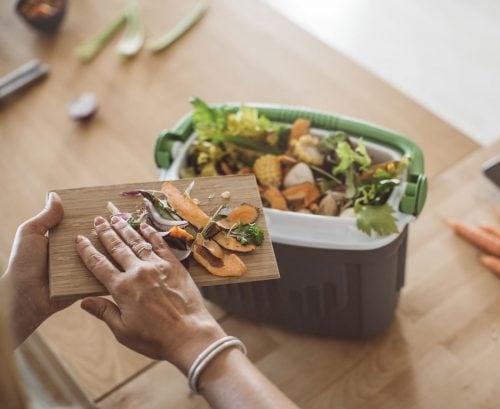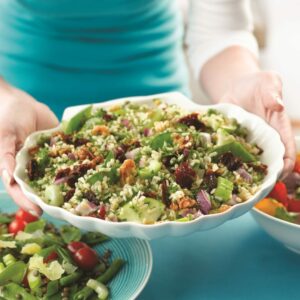
Did you know a whopping 300 kilos of food per person is wasted each year? Yikes! HFG shows you how to maximise your grocery shop and stop throwing out unused food.
Imagine doing your weekly food shop, only to throw away a whole bag of perfectly good food as soon as you get it home. It sounds ludicrous, but the reality is that one in every five grocery bags ends up in the bin. That adds up to almost $4000 worth of groceries a year! And home isn’t the only place where food goes to waste. Farming, the food manufacturing industry and the hospitality sector (cafes and restaurants) also contribute significantly to food waste.
Not only does household food waste affect your bank balance, it hits the environment hard. “Food waste is a huge contributor to climate change, as it’s responsible for eight per cent of global greenhouse gas emissions — that’s more than the aviation sector,” says OzHarvest Sustainability Strategist Annika Stott. “When food is left to rot in landfill it creates methane, which is 25 times more potent than carbon dioxide,” she adds.
If you want to do your bit for the environment and save your hard-earned money at the same time, follow our easy tips for reducing food waste.
1. Shop smarter Know what you’ve already got at home before you hit the shops. Then write a shopping list — and stick to it! Take a ‘shelfie’ (a photo of your pantry shelf on your phone) you can refer back to while you’re at the supermarket.
2. Google leftover ingredients for recipe inspiration Barbecue chicken turned into savoury crepes, anyone?
3. Invest in a good collection of clear, air-tight containers and start using them Storing food correctly has a big impact on how long it lasts.
4. Make pasties Roast leftover vegetables, then roll up in a parcel of filo pastry to create a tasty, lighter evening meal.
5. Forget your veggie peeler Most veg don’t need to be peeled — a quick scrub of carrots and spuds means you can eat the whole thing, so invest in a vegetable brush instead.
6. Make DIY muesli bars Combine that remaining scoop of peanut butter, the half-used packet of almond meal and those leftover porridge sachets at the end of winter, and you’ve got healthy homemade muesli bars.
7. Devise a weekly meal that will clean out the contents of your fridge Cook up a stir-fry or a weekend omelette to use up all the veggies still sitting in your crisper drawer.
8. Know the difference between use-by and best-before Use-by dates should be followed to a tee. Foods past their use-by date can be unsafe to eat, but you can freeze them as they near their use-by date to extend their life. Best-before dates, on the other hand, are about quality. Foods might not be in their prime, but can still be okay to eat after the date on the label.
9. Plant your own herbs so you have them to use only when you need them. This stops you from buying a big bunch, and wasting most of it.
10. Juice spare lemons, limes and oranges and freeze the juice in ice cube trays. On hot days, they will make a refreshing addition to a glass of water.
11. Practise the first in, first out rule when stocking the pantry, fridge and freezer, to help stay on top of use-by and best-before dates.
12. Wash fresh fruit and veg only before eating them If you wash fresh produce all at once after you bring it home from the greengrocer/supermarket, it spoils quickly.
13. Think root to tip Try to use all parts of a vegetable. For example, instead of just the florets of a broccoli or cauliflower, finely chop the stalks to bulk up spaghetti bolognese or meatballs.
14. Practise preserving Pickling and fermenting foods might have only recently become mainstream in modern households, but they have a long history of being used to make food last longer.
15. Pour a cuppa Instead of throwing away leftover lemon peel or knobs of ginger, steep them in hot water to create a fragrant homemade brew.
16. Use your freezer Label and date what you freeze so you know what it is the next time you go looking.
17. Check your freezer regularly Whether it’s weekly, fortnightly or monthly, plan a regular time to use up what’s stored in your freezer.
18. Start a compost for food scraps you can’t incorporate into meals.
19. Whip up a healthy homemade stock using the vegetable trimmings you can’t eat. Bean ends, onion peelings, carrot tops and fennel fronds are all ideal.
20 Stock up on long-life pantry staples so you can whip up a basic meal with fresh produce from your fridge.
Why do we waste food?
The main reasons for food going to waste include:
- Lack of planning
- Buying and cooking more than we need
- Not storing fresh food correctly
- Not keeping track of expiry dates
- Not knowing how to use up leftovers.
Your pantry staples
These inexpensive and long-life ingredients pair well with fresh ingredients, so make sure you keep a good stock of them in your pantry and freezer.
- Rolled oats
- Brown rice
- Wholemeal pasta
- Peanut butter
- Canned tuna
- Baked beans
- Long-life milk
- Mixed nuts and seeds
- Frozen peas and corn
- Frozen mixed berries
Article sources and references
- Department of Agriculture, Water and the Environment. 2021. Tackling Australia’s food waste. Accessed June 2021 https://www.environment.gov.au/protection/waste/food-waste
- Department of Agriculture, Water and the Environment. 2021. Working together to reduce food waste in Australia. Accessed June 2021https://www.environment.gov.au/protection/waste/publications/food-waste-factsheet
- Foodbank. 2021. Food waste facts. Accessed June 2021https://www.foodbank.org.au/food-waste-facts-in-australia/?state=au
- OzHarvest. 2019. Fight food waste. Accessed June 2021.https://2019annualreport.ozharvest.org/fight-food-waste/
www.healthyfood.com










